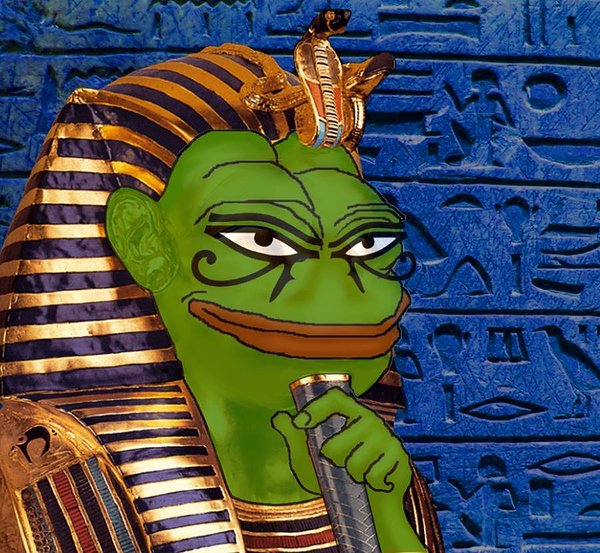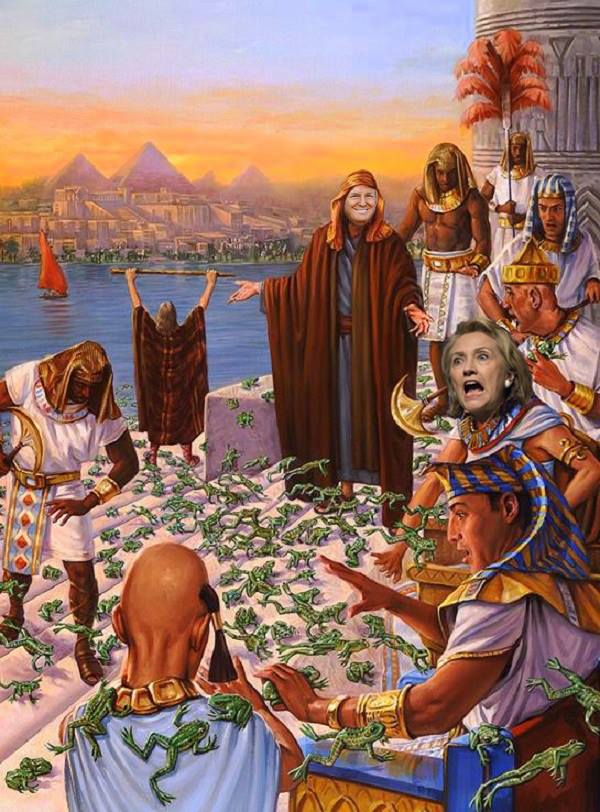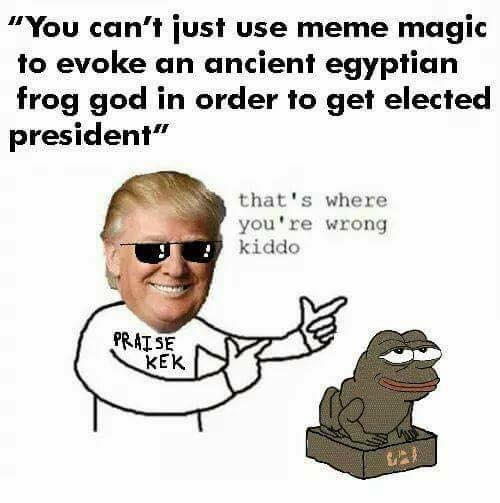Lawrence Murray
Atlantic Centurion
December 14, 2016
Were the plagues truly meant to bring Pharaoh to heel? Do you believe the unreliable Hebrew narrators of the Torah? Or were they instead a manifestation of chaos, originating on the Nile, meant to drive the Hebrews out of Egypt? Results matter. The result was the Hebrew exodus from Egypt. Kek: 1. YHWH: 0
Post-ironic meme dharma centered on frog iconography and the reverence of an ancient Egyptian pagan god of primordial chaos is one of the most important developments of 2016 (and of a uniquely syncretic and post-postmodern Alt-Right spirituality). Esoteric Kekism, a religion of peace but more importantly a religion of resistance to the managerial world order, means seeing to change the world through a mischievous, magickal, and at times malicious paradigm. We desire great change, but individually we do not have the power to affect it. It is only through the amplification of meme magick and through the sigils and icons that the power of collectively-held ambitions and grand visions can be channeled for the good of our people and the spread of our ideas. Give me control of a nation’s memes and I care not who makes its laws; that is the essence of metapolitics and thus the essence of achieving societal transformation.
Just as the nationalist must rethink and relearn much of what he once thought he knew, the Esoteric Kekist faces a similar problem when approaching the corpus of humanity’s knowledge and experiences. The rationalism (and self-defeating universalism) of the “Enlightenment” gives way to a new Romanticism and to belief in higher powers and causes than one’s own immediate gratification and the expansion of his material and financial assets. In a world where not the value added but what people value is being debated, everything is thrown asunder. Heroes become villains. Villains become heroes. What was taken for granted as good becomes understood as cursed. What seemed like a blight on civilization becomes its redemption.
In Genesis, when Joseph was sold as a slave into Egypt and rose to become the pharaoh’s court magician (and second most powerful man in the land), he ultimately brought the Hebrews with him. The traditional narrative is that they became a race of slaves to the Egyptians, so then their god Yahweh sent Moses to deliver them from slavery and led them to their “promised land” in Canaan. Through miraculous demonstrations of Yahweh’s power and protection in Egypt, the Hebrews were brought together into a single tribe and the Egyptians compelled to release them from their bonds.
But that is merely the winners’ narrative of what happened. What if Joseph and his people were in fact the plague in the first place? The Hebrews were known for being a folkwandering people—in this particular episode they were a foreign horde descending upon a sprawling empire’s doorstep, taking advantage of it by worming their way into its administration and using that power to serve their factional interest at the net expense of the natives. What if they were the ones imposing their own order on Egypt, instead of being ordered by the Egyptians?
What if then the biblical plagues, rather than the wrath of Yahweh, were in fact the chaos of Egypt’s Kek, meant to drive the Hebrews from the country? Nothing is more destructive of an imposed order than supernatural disaster(s). The frogs, locusts, diseases, and other plagues upon the land could be taken as a completely opposite sign of what the Hebrews committed themselves to remembering. Not punishment, but something else entirely.
A country which has been ruined cannot support parasites. It can be regrown if the roots of its people have survived, but those without roots can play no part in its revitalization. They are forced to leave, because without produce there is nothing to plunder. We must remember that by invoking chaos, we are not saving ourselves. We seek an opportunity for changing a stagnating, if not regressive, order. Kek is not the champion of stability and golden ages but he who dwells in primordial darkness. Darkness engulfs and breaks down organization, but darkness only blinds the unprepared. Those who have not made preparations to last through the night until the dawn will not see the morning light when the great sun disc returns. And so plagues, as a ritual form of cleansing and a sacred destruction stage in the cycle of creation and re-creation, are a means of ousting the unprepared and parasitic. They are a painful trial that serves to prevent the ship of state from rotting at anchor and dissolving into the harbor.
And so Kek, who drove the original Hebrews from Egypt by rendering their host inhospitable, returns with a vengeance to a world where the same sort of managerial order seeks to impose itself. Chaos returns to overturn the venomously corrosive hierarchy. The plagues were not about punishment but part of that great cycle of human history, that of creation and re-creation. To create is to destroy; one cannot exist without the other. One cannot build a tower without demolishing what was there first. Plagues bring great destruction—but also great cleansing—and therefore allow for new creation.
In 2016, the United States witnessed a plague of frogs. The prominence of Pepe (an icon of Kek) throughout the election can be taken as a sign of divine Providence. Those who took up the sign which had been revealed to them, like the Roman emperor Constantine, found victory in battle. Those who had spurned it were vanquished. While President Trump embraced the sign of Kek by retweeting an image of himself as Pepe and thereby achieved the 270 get, Hillary Clinton rejected it by condemning the avatar of Kek on her own campaign website and mobilizing the press against Pepe. Kek appeared to Trump through Pepe just as the Christian God appeared to Constantine through the Chi Ro. By taking up his sign, Trump was granted power over his enemies.
The plague of frogs has certainly made the land of the United States less hospitable to its parasites. “America First” is antithetical to the Hebrews, while President Trump’s calls to expel illegal settlers and seal off the border also render the country hostile to further exploitation at their hands.
The Jewish press makes no attempt to hide their hatred for President Trump; truly then he is a “plague” upon their house. If America is such a horrible racist and anti-semitic country, perhaps it is time for an exodus? Surely you’ve been through worse—you never hesitate to remind us—but why take chances? The promised land calls the children of Israel home. Are you really going to “fight” Trump by doing everything populists accuse (((the elite))) of doing in the first place? Not a good plan. Chaos tends to win, and the chaos candidate has won. The god of primordial darkness has sent his sign.
At the same time, Time magazine calls President Trump the leader of the “Divided States of America.” Hysteria engulfs the country as leftists and people of color demonstrate against the idea of having a national populist for president, making the case for partition. Nationalism for some and diversity for others would mean disorder it is true; but would be an act of creation as much as an act of destruction. That the American Empire may become a thing of the history books is perhaps the most chaotic writing on the wall of all. And it might have been set in motion by a plague of frogs, brought forth by the chaos god himself.
 Daily Stormer The Most Censored Publication in History
Daily Stormer The Most Censored Publication in History





